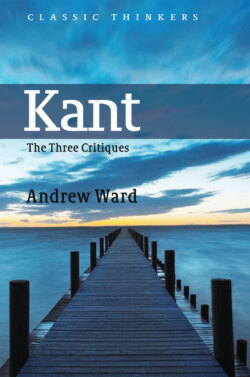Читать книгу Kant - Andrew Ward - Страница 27
What has the Transcendental Aesthetic achieved?
ОглавлениеWithin the overall framework of the First Critique, the purpose of the Transcendental Aesthetic is to answer the question: How are synthetic a priori judgments possible in pure mathematics (where they are known to exist)? It has been answered by showing that space and time are not things in themselves or relations between things in themselves, but merely the forms of our sensibility.This answer equally shows that we cannot extend our mathematical knowledge to what exists outside our modes of intuition; in particular, it cannot be extended to things in themselves.While the synthetic a priori judgments of geometry and arithmetic are valid for space and time respectively – and thereby, as will be shown, for the empirical objects in space and time – they can have no validity beyond space and time (beyond, that is, outer and inner intuition) and the empirical objects that can exist in space and time (i.e. appearances). In short, their validity, as both synthetic and necessary, cannot be extended beyond the objects of our senses, beyond the objects of possible experience.
These last points are well summed up in the final passage of the Transcendental Aesthetic, which was added for the second edition:
Here, then, in pure a priori intuitions, space and time, we have one of the factors required for the solution of the general problem of transcendental philosophy: how are synthetic a priori judgments possible? When in a priori judgment we seek to go out beyond the given concept, we come in the a priori intuitions upon that which cannot be discovered in the concept but which is certainly found in the intuition corresponding to the concept, and can be connected with it synthetically. Such judgments, however, thus based on intuition, can never extend beyond objects of the senses; they are valid only for objects of possible experience. (B 73; italics original).
Of course, the Aesthetic will only really have achieved these results if Kant is correct in his derivation of the concepts of space and time. We have seen that the Transcendental Exposition of space (and similarly of time) depends on a view of geometry (and arithmetic) which is no longer generally accepted. It might be replied that if we were to reject his view of mathematics, this would merely mean that he is not called upon to explain how there can be synthetic a priori judgments in mathematics, since there is nothing to explain. This, it is alleged, simply lightens his burden – he now need only explain how there can be genuine synthetic a priori judgments in natural science.
But that answer is unsatisfactory. The synthetic a priori nature of mathematics is required for what, as Kant himself acknowledges, are his strongest arguments for the ideality of space and time: namely, their Transcendental Expositions. His claim that space and time ‘belong to the subjective constitution of the mind’ plays a pivotal role in his defence of natural science against scepticism, and – at least as important to him – in his defence of freedom of the will. By his own lights, if the objects of our experience are things in themselves (which they will be if space and time are not ideal), there can be no possibility of proving the reality of either natural science or freedom of the will.
The result is that, if the Transcendental Expositions of space and time are rejected, the whole burden of proof falls on the Metaphysical expositions, since these expositions also seek to establish that space and time are merely forms of our intuition. Alternatively, one might try to show that, at least with respect to natural science, the kernel of Kant’s arguments does go through even on a realist, rather than on an idealist, framework. Although a number of philosophers have made the attempt, I do not believe that this alternative strategy can be successful. When we consider Kant’s proofs for the three principles given in the Analogies section – and it is these principles which constitute the basis of natural science as he conceives it – we shall find that their validity depends upon his idealism. Without it, as Kant himself realized, his mode of proof would lack cogency. In fact, his attempted proofs would be full of logical howlers.
